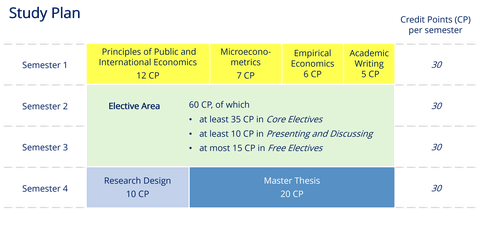Content and Structure
Table of contents
Overview
The Master’s in Public and International Economics (PIE) is a four-semester, full-time program (120 credit points) designed to give you both a strong foundation and the flexibility to tailor your studies to your interests. Below, you’ll find an outline of the program structure and content, including compulsory and elective modules for each semester.
Study Plan at a Glance
- Duration: 4 semesters (full-time)
- Total credits: 120 ECTS (approx. 30 per semester)
- Structure:
- Semester 1: Foundations (compulsory modules)
- Semesters 2 & 3: Electives (choose your focus)
- Semester 4: Research Design & Master’s Thesis
Semester 1: Foundations

© Klaus Gigga

© Klaus Gigga

© PantherMedia / perig76
Your first semester builds essential methodological and subject knowledge. All modules are compulsory and provide a balanced mix of theory and empirical methods:
- Principles in Public and International Economics (12 CP): Theoretical foundations
- Microeconometrics (5 CP): Empirical methods
- Empirical Economics (7 CP): Applied empirical analysis
- Academic Writing (6 CP): Scientific research skills, literature search, and citation
All teaching materials are available on OPAL. Find your OPAL courses of the first-semester here.
Semesters 2 & 3: Electives

© Klaus Gigga

© Klaus Gigga

© Klaus Gigga
Shape your studies by choosing from a wide range of electives. There are no compulsory modules, but you must fulfill these requirements (total: 60 CP):
- Core Electives: at least 35 CP
- Presenting and Discussing: at least 10 CP
- Free Electives: up to 15 CP (or use these credits for more Core or Presenting/Discussing modules)
Core Electives
Deepen your expertise in areas such as public economics, economic policy, international economics, and development. Example modules include:
- Current Topics in Applied Econometrics
- Development Economics
- Economics of Migration
- Exchange Rates
- International Financial Markets
- International Public Economics
See the full, regularly updated list of Core Electives.
Presenting and Discussing
Develop your skills in presenting, discussing, and critically engaging with current research. You’ll participate in seminars and projects, presenting and debating recent scientific contributions. See the current schedule of Presenting and Discussing modules.
Free Electives
Broaden your profile with interdisciplinary courses, an internship, or a German language course. See the current list of Free Electives.
Semester 4: Research Design & Master’s Thesis

© Klaus Gigga

© Klaus Gigga

© Klaus Gigga
Your final semester focuses on independent research:
- Research Design (10 CP): Analytical and methodological preparation, with ongoing feedback from your supervisor
- Master’s Thesis (20 CP): Conduct independent research on an economic topic over 18 weeks
Requirements:
You must have earned at least 75 CP before starting your thesis, and you must begin no later than the semester after your last exam. Each Chair has its own procedures for thesis topics and registration. Check the requirements here.
Flexible Study Options
You may also study PIE part-time, earning at least 15 credits per semester. This allows you to adjust your study plan by deferring or spreading out modules.










